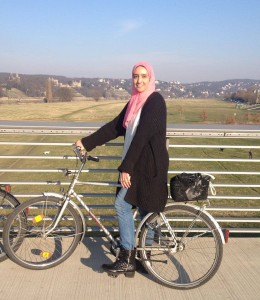By: Nermine Mohamed, Writing Intern 2015
 I never like to talk about why I wear “Hijab”, even back in my own country, although it was not a big deal as I belonged to the majority. What’s uncommon is not wearing it. But after moving to a Western country, I become the uncommon, the different as I look and dress differently than others. It never bothered me being the “outcast”; on the contrary I feel more comfortable and at ease with myself here than back in my own country. But what does bother me is that I always get asked a lot of questions which always make me feel uncomfortable. Being a very private person, I don’t really like people asking me questions about my personal life or my beliefs, unless we are in a very close relationship to allow for such discussions. I understand that some people simply ask out of curiosity or interest to know more about a different culture and religion.
I never like to talk about why I wear “Hijab”, even back in my own country, although it was not a big deal as I belonged to the majority. What’s uncommon is not wearing it. But after moving to a Western country, I become the uncommon, the different as I look and dress differently than others. It never bothered me being the “outcast”; on the contrary I feel more comfortable and at ease with myself here than back in my own country. But what does bother me is that I always get asked a lot of questions which always make me feel uncomfortable. Being a very private person, I don’t really like people asking me questions about my personal life or my beliefs, unless we are in a very close relationship to allow for such discussions. I understand that some people simply ask out of curiosity or interest to know more about a different culture and religion.
Although I know that this is not normal and religion questions are a red line for many people, yet a friend of mine once told me that by wearing a veil, I explicitly identify myself as a Muslim, which means I am open to discussing my religion and my beliefs. It is a valid argument, yet it completely ignores the other side who certainly would not like being asked these kinds of questions by random strangers or people I have just met or people who have no business prying into my personal life, my wardrobe or what parts of my body I am to cover or uncover.
Yet, I always know how to adapt and go with the flow and apart from the silly questions of whether I sleep or shower in it; mostly people ask me why I wear it. I always try to cut the conversation short and just give the standardized answer without going deep into the subject: It is out of modesty. One other time, my manager suddenly and quite out of the blue while working, came to me and asked me whether those who don’t wear the “Hijab” are considered bad and I am ultimately better than them. I was startled by the question and I told him definitely not and that it is a personal decision and has nothing to do with who’s better and who is not. This is why I decided to write about Hijab and modesty.
I first wore my Hijab when I was really young about 13-14, but not out of religious reasons or anything. I just wanted to look different as it was not that common back then. Being a childish decision, I took it off shortly after for more than a year. I wore it again, but this time was me trying to be more religious. I wore it this time longer for 3 or 4 years and then I started to feel uncomfortable, burdened, shackled. I could not do it anymore. Part of me kept on saying that I would be happier and freer once I take it off. And I did. I took the decision and told my family who was not really happy about it, but did not force me to do anything against my will. It was only for a day and actually no one really knew about it as I wore it again the next day. All I remember is that I felt uncomfortable and did not feel like myself. Now I am pretty much at ease with it. I decided to stick with my decision, to see it as something I am doing to be closer to my faith.
But, looking back at that time when I took off my Hijab for this one day and then decided against it, I know that part of me was afraid and not quite ready to face all the jaw-dropping stares, the whys questions, the go back to God-preaching and the you will go to hell-threats, which any woman who takes it off is subjected to. I know that while I had the freedom to decide for myself, others don’t have this leisure, and are being forced or pressured by society to wear what is seen as a sign of modesty and are being judged and measured by this scale of modesty that only a simple scarf on the head defines.
I decided to wear something that defines my faith and who I am, but faith never means the absence of doubt. As any human being, I have my own doubts. My mind is buzzing every minute of every day with so many questions that I don’t have any answers to and a continuous struggle to reconcile between my worldly views and my spirituality. And I cannot reconcile with how Hijab is seen as a sign of modesty, because all these labels and definitions always tend to single out something as the modest, the right, the good, the worthy and leave the rest behind or implicitly taunt and criticize all that’s different from the prescribed definition or image. I know that my faith is not and should not be measured by what I wear. I know that what I wear is not by any means the ultimate definition of modesty. I know that a woman should be free to dress as she feels like, and people have no right to ask a woman why she is wearing or not wearing something.
That’s why I’d like to think of modesty (of any kind) as a decision. And there is never a clear-cut formula for a decision. Decisions are personal, a part of who we are and our personal journey. We should have the freedom to make our own decisions. We should have the right to doubt them, to change them without needing to explain or to justify our reasons. And we should never ever be judged or measured by others’ decisions.



